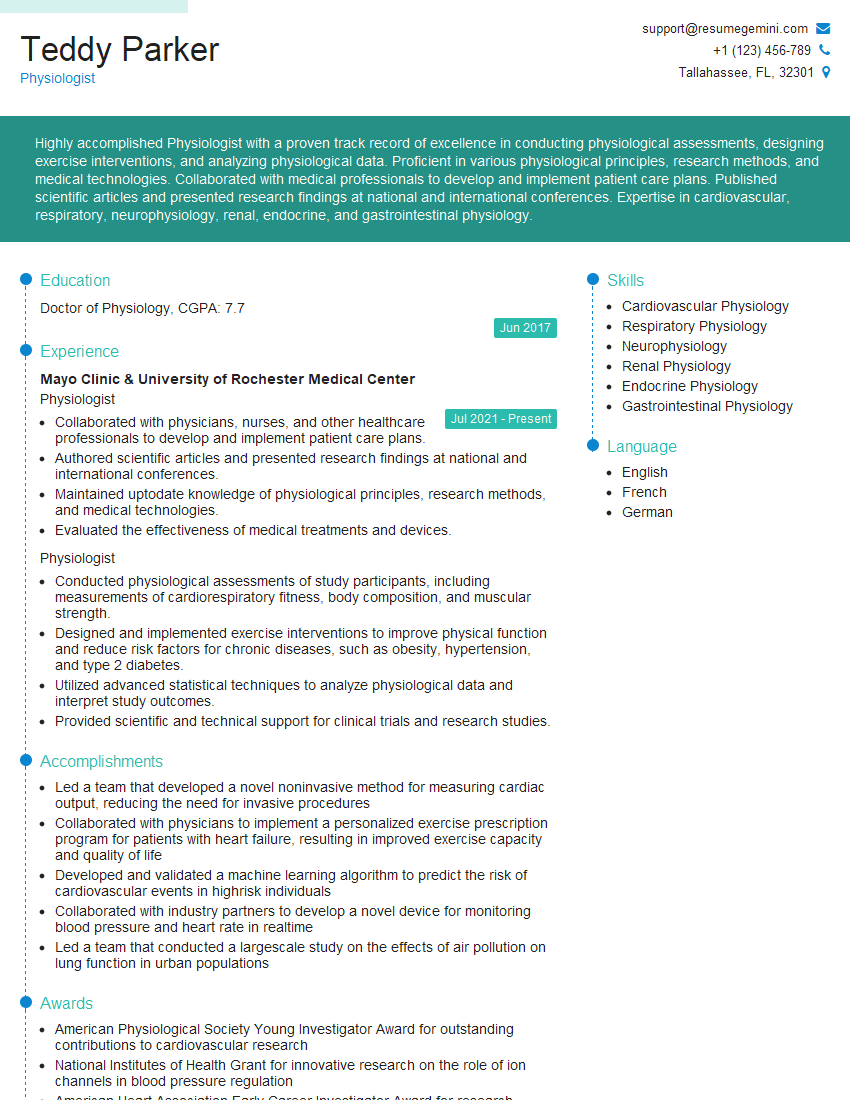Are you a seasoned Physiologist seeking a new career path? Discover our professionally built Physiologist Resume Template. This time-saving tool provides a solid foundation for your job search. Simply click “Edit Resume” to customize it with your unique experiences and achievements. Customize fonts and colors to match your personal style and increase your chances of landing your dream job. Explore more Resume Templates for additional options.

Teddy Parker
Physiologist
Summary
Highly accomplished Physiologist with a proven track record of excellence in conducting physiological assessments, designing exercise interventions, and analyzing physiological data. Proficient in various physiological principles, research methods, and medical technologies. Collaborated with medical professionals to develop and implement patient care plans. Published scientific articles and presented research findings at national and international conferences. Expertise in cardiovascular, respiratory, neurophysiology, renal, endocrine, and gastrointestinal physiology.
Education
Doctor of Physiology
June 2017
Skills
- Cardiovascular Physiology
- Respiratory Physiology
- Neurophysiology
- Renal Physiology
- Endocrine Physiology
- Gastrointestinal Physiology
Work Experience
Physiologist
- Collaborated with physicians, nurses, and other healthcare professionals to develop and implement patient care plans.
- Authored scientific articles and presented research findings at national and international conferences.
- Maintained uptodate knowledge of physiological principles, research methods, and medical technologies.
- Evaluated the effectiveness of medical treatments and devices.
Physiologist
- Conducted physiological assessments of study participants, including measurements of cardiorespiratory fitness, body composition, and muscular strength.
- Designed and implemented exercise interventions to improve physical function and reduce risk factors for chronic diseases, such as obesity, hypertension, and type 2 diabetes.
- Utilized advanced statistical techniques to analyze physiological data and interpret study outcomes.
- Provided scientific and technical support for clinical trials and research studies.
Accomplishments
- Led a team that developed a novel noninvasive method for measuring cardiac output, reducing the need for invasive procedures
- Collaborated with physicians to implement a personalized exercise prescription program for patients with heart failure, resulting in improved exercise capacity and quality of life
- Developed and validated a machine learning algorithm to predict the risk of cardiovascular events in highrisk individuals
- Collaborated with industry partners to develop a novel device for monitoring blood pressure and heart rate in realtime
- Led a team that conducted a largescale study on the effects of air pollution on lung function in urban populations
Awards
- American Physiological Society Young Investigator Award for outstanding contributions to cardiovascular research
- National Institutes of Health Grant for innovative research on the role of ion channels in blood pressure regulation
- American Heart Association Early Career Investigator Award for research excellence in cardiovascular physiology
- International Society of Hypertension Young Investigator Award for outstanding contributions to hypertension research
Certificates
- Certified Clinical Physiologist (CCP)
- Certified Exercise Physiologist (CEP)
- Registered Polysomnographic Technologist (RPSGT)
- Certified Sleep Technologist (CST)
Career Expert Tips:
- Select the ideal resume template to showcase your professional experience effectively.
- Master the art of resume writing to highlight your unique qualifications and achievements.
- Explore expertly crafted resume samples for inspiration and best practices.
- Build your best resume for free this new year with ResumeGemini. Enjoy exclusive discounts on ATS optimized resume templates.
How To Write Resume For Physiologist
- Highlight your skills and experience in specific areas of physiology, such as cardiovascular, respiratory, or neurophysiology.
- Quantify your accomplishments whenever possible, using specific numbers and metrics to demonstrate your impact.
- Showcase your research skills and experience, including any publications or presentations you have made.
- Demonstrate your ability to work effectively in a team environment, collaborating with other healthcare professionals.
Essential Experience Highlights for a Strong Physiologist Resume
- Conducted physiological assessments of study participants, including measurements of cardiorespiratory fitness, body composition, and muscular strength.
- Designed and implemented exercise interventions to improve physical function and reduce risk factors for chronic diseases, such as obesity, hypertension, and type 2 diabetes.
- Utilized advanced statistical techniques to analyze physiological data and interpret study outcomes.
- Provided scientific and technical support for clinical trials and research studies.
- Collaborated with physicians, nurses, and other healthcare professionals to develop and implement patient care plans.
- Authored scientific articles and presented research findings at national and international conferences.
Frequently Asked Questions (FAQ’s) For Physiologist
What is a physiologist?
A physiologist studies the functions and mechanisms of living organisms, including humans, animals, and plants.
What does a physiologist do?
Physiologists conduct research, design experiments, and analyze data to understand how living organisms function. They also develop and test treatments for diseases and injuries.
What are the educational requirements for a physiologist?
Physiologists typically need a bachelor’s degree in physiology, biology, or a related field. Some physiologists also earn a master’s degree or doctorate.
What are the job prospects for physiologists?
The job outlook for physiologists is expected to be good over the next few years. As the population ages, there will be a growing need for physiologists to conduct research on age-related diseases and develop new treatments.
What are the key skills for a physiologist?
Physiologists need to have strong analytical and problem-solving skills. They also need to be able to communicate their findings effectively to both scientific and non-scientific audiences.